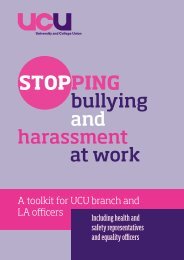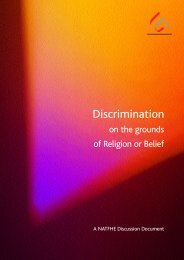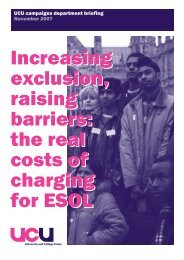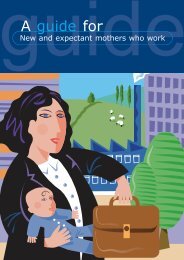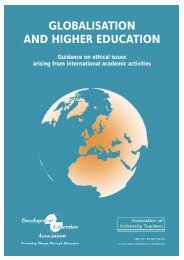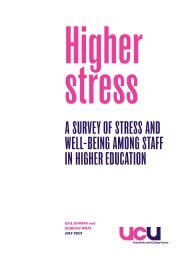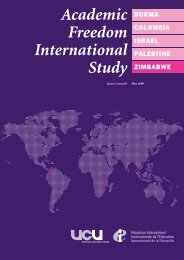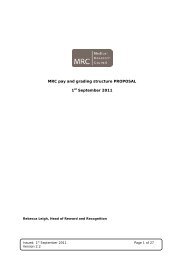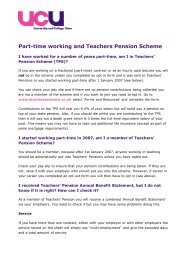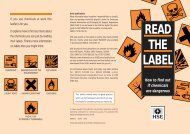UCU Life Changers Text
UCU Life Changers Text
UCU Life Changers Text
You also want an ePaper? Increase the reach of your titles
YUMPU automatically turns print PDFs into web optimized ePapers that Google loves.
Professor Dick Hobbs<br />
London School of Economics<br />
’I was told by these<br />
important people that<br />
my life experience,<br />
my class background,<br />
was not to restrict me,<br />
and that I might have<br />
something to say that<br />
other people didn’t<br />
know about.’<br />
Tea boy, labourer, dustman, roadsweeper...academic. It’s<br />
not the average career path, but it worked for Dick Hobbs.<br />
’I came from a very working class background in East<br />
London, and failed my 11-plus. After several years of<br />
working in really low level jobs—I did anything to make<br />
a few bob—I decided to go to night school.<br />
’I didn’t know how to write an essay or indeed a<br />
sentence, but a teacher called Tony Goldman took me<br />
on. He taught me to read, taught me to write properly,<br />
showed some interest in me. He seemed to feel I might<br />
have something to offer from my background.’<br />
Twenty years on, and Dick had become Professor<br />
Hobbs, lecturing in sociology<br />
at the University of<br />
Durham, via teacher training<br />
college, a masters at<br />
the LSE, a PhD at Surrey<br />
and a first job at Oxford.<br />
Slowly but surely, over<br />
the 1990s, Professor<br />
Hobbs helped build up a<br />
group of working class<br />
sociology students at<br />
Durham. One of those was<br />
Rob Hornsby. He struggled<br />
badly in his first year at<br />
Durham, failing four out of<br />
five exams.<br />
’It’s a huge transitional process,’ explains Hornsby,<br />
’coming from a working class background and finding<br />
yourself deposited in something that is intrinsically a<br />
middle class establishment.<br />
’Second year, I took one of Dick’s modules. I enjoyed<br />
his lecturing style, he was open and approachable. Dick<br />
always looked out for hard-working students who didn’t<br />
have the financial or cultural support in which to<br />
engage fully with higher education.’<br />
’Those working class students who had maybe been<br />
knocked back by education previously, they seemed to<br />
come to me and to a few other colleagues,’ says<br />
Professor Hobbs. ’They largely came from similar<br />
backgrounds to my own, and they felt comfortable with<br />
me and I felt comfortable with them.’<br />
Hornsby says Professor Hobbs went out of his way to<br />
drive forward students who showed potential. ’He gave<br />
up a lot of time, he mentored, he found people work,<br />
promoted them for research jobs. Dick realised how<br />
higher education could be life enhancing for those<br />
working class students who came through, because he<br />
came from a working class background himself.’<br />
At this point it is easy to reach for well-worn clichés<br />
about working class heroes, turning students and<br />
academics into raggrd trousered philanthropists fighting<br />
The System in pursuit of The Cause. But Professor<br />
Hobbs has no time for such dreamy-eyed notions.<br />
’The important thing in dealing with students like this<br />
is not to patronise them, and not to make special allowances.<br />
The key thing is to give them the confidence that<br />
they’ve got something to say, that their experiences of<br />
life are important.<br />
’Often they bring something to higher education that<br />
established academics can only read about.’<br />
It is a message that was drummed<br />
into him when he was finding his<br />
own feet, not only by Tony Goldman,<br />
but also by David Hooper at Teacher<br />
Training College, David Downes at<br />
LSE and Nigel Fielding at Surrey. ’I<br />
was told by these important people<br />
that my life experience, my class<br />
back-ground, was not to restrict me,<br />
and that I might have something to<br />
say that other people didn’t know<br />
about.<br />
’Some working class students can<br />
undervalue their own worth, but it’s<br />
not true. They bring with them their<br />
experience of their community, of<br />
their family, their work, and that’s quite important.’<br />
Professor Hobbs recently moved on from Durham,<br />
and is now head of sociology at LSE and a renowned<br />
ethnographic researcher. He warns that growing class<br />
sizes make it harder to build the personal relationships<br />
that allow academics to spot which stu-dents need<br />
more support. ’I think it’s easy for those students to slip<br />
through the net. It is more difficult to get to know<br />
students. There is a distancing, and that is a great<br />
shame.’<br />
Rob Hornsby is now Dr Hornsby, working as an<br />
academic at York. He has no doubt about Professor<br />
Hobbs’ influence. ’He has made such an impact on the<br />
lives of those that I know.<br />
’If I hadn’t met Dick in the second year as an<br />
undergraduate, I would have failed my degree. I doubt I<br />
would have got through to the spring term of my<br />
second year. He fundamentally altered my life.’<br />
Page 4<br />
www.ucu.org.uk/lifechangers


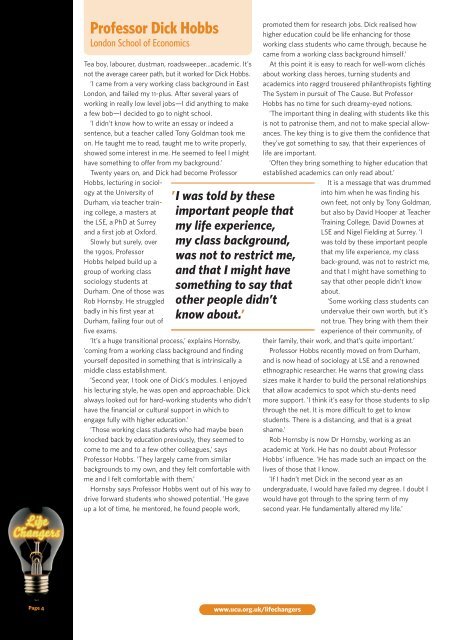
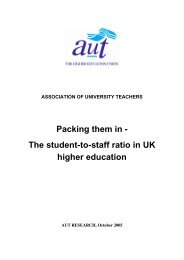
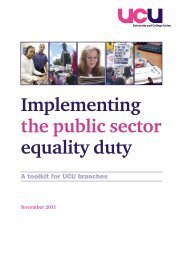
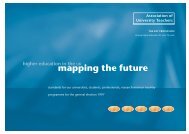
![(.pdf) [29kb] - UCU](https://img.yumpu.com/50914942/1/184x260/pdf-29kb-ucu.jpg?quality=85)
